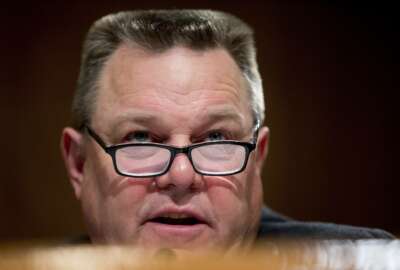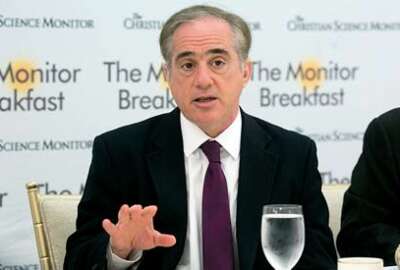

Restoring veterans' trust and mending gaps between the department's headquarters and its employees in the field are top priorities for Tom Bowman, the president's...
Veterans Affairs Secretary David Shulkin is looking to a seasoned professional of the military, Defense Department, Congress and VA itself to serve as his number two.
Tom Bowman is the son of a Pearl Harbor veteran. He himself also served in the Marine Corps and relies on the VA for most of his own health care.
“I continue to use the VA health care system because I trust it,” he told the Senate Veterans Affairs Committee during a July 19 nomination hearing.
The committee heard from Bowman, as well as nominees for two senior level positions and three nominees for the U.S. Court of Appeals for Veterans Claims.
Bowman recognized that not all veterans share that same sense of confidence in the department. Restoring trust in VA will be one of his top priorities, he said.
Bowman also spent about 10 years as the chief of staff at the department and as a senior adviser to a VA health care director in Florida before returning to Washington, where he served as a staffer and then majority director for the Senate VA Committee.
Committee Chairman Johnny Iskason (R-Ga.) sung Bowman’s praises.
“This committee was languishing for a few years without having strong leadership on the staff to make sure the ranking member and the chairman did the right thing,” Iskason said. “Tom has done that for me.”
But Bowman also brings experience as a caretaker. His wife, Joan, battled ovarian cancer for seven years, and Bowman acted as her primary caretaker for the last seven months of her life.
“That experience has provided me clear and present understanding of the physical and emotional sacrifice that caregivers for our veterans experience daily in caring for their loved ones,” he said.
Bowman said Shulkin has asked him to essentially serve as the department’s chief operating officer. He wants Bowman to oversee daily operations and senior executive management both at VA headquarters and field offices.
“Currently, there is a disconnect between the field and VA headquarters, not purposeful, but there is a disconnect,” Bowman said. “Many times the [Veterans Integrated Service Network] director sets the policy for those medical centers that are within his VISN or her VISN. Then the medical centers only pay attention to what the VISN director says, not necessarily what they’re aware of as the policy. When you deal with that number of VISNs across the country, you have inconsistent approaches to providing information back to the VA headquarters for oversight.”
Brooks Tucker, the nominee to be VA’s assistant secretary for congressional and legislative affairs, said he plans to encourage his office to have a more visible presence and develop a unified voice on Capitol Hill.
“Secretary Shulkin has recognized the growing need for cohesive and coordinated communication with Congress and a more responsive level of engagement with members and their staffs,” Tucker said. “To address that need, he directed the Office of Legislative and Congressional Affairs to consolidate effective July 1, what were previously separate but related functions and staffs in the Veterans Health Administration and Veterans Benefits Administration.”
Shulkin wants one unified legislative and congressional affairs staff in place by Oct. 1.
Committee Ranking Member Jon Tester (D-Mont.) wants Tucker and the department to develop better communication skills with members of Congress.
He was particularly frustrated with the timeline VA took to inform Congress of the coming funding shortfalls for the Veterans Choice Program. The department told Congress that it had a less than $1 billion left in the Choice fund on June 7. By June 30, Tester said he received a legal notice that 75 percent of the Choice fund was exhausted.
The goal for the department is to eventually respond to most congressional requests within two weeks. But Tester said agency-congressional communication should be fast and clear.
“Often times we ask questions … but we don’t get answers,” he said. “We get folks talking in circles. So when the questions are asked and you write the letter back, read the letter and ask yourself, ‘Does this actually answer the questions that these guys have asked?'”
The committee also sees a big role for James Byrne, VA’s nominee to be the department’s general counsel.
“You have, in my judgment, one big job ahead of you, and that’s making sure that the accountability bill is implemented and it’s implemented fairly,” Isakson said. “It’s executed appropriately and it works.”
Byrne promised he would effectively and consistently implement the provisions of the VA Accountability and Whistleblower Protection Act, which the president signed into law last month.
“The relationships are going to be very key, in particular the relationship between the inspector general, OGC, HR and this new office,” Byrne said. “I’m coming in with a fresh look at this, understanding that we all need to work very closely together in implementing this act.”
Isakson said the committee plans to vote on nominations Thursday morning.
“We don’t know exactly what the end of the session is going to be like, so I want to get it done tomorrow and get it done now so … they can go to work,” he said. “Every day they’re not working our veterans are not being served.”
Copyright © 2025 Federal News Network. All rights reserved. This website is not intended for users located within the European Economic Area.
Nicole Ogrysko is a reporter for Federal News Network focusing on the federal workforce and federal pay and benefits.
Follow @nogryskoWFED


